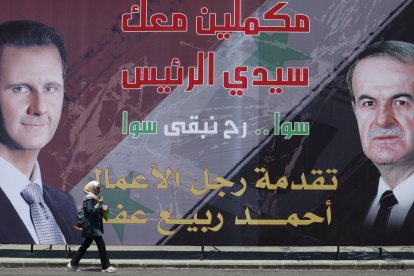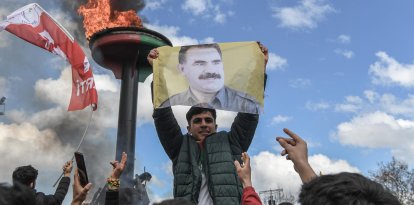The Assad dynasty in Syria: a history of violence, authoritarianism and corruption
The family ruled the Arab country for 54 years, during which they cracked down on the population with an iron fist and took billions of dollars.

A poster with the image of Hafez al-Asad and his son Bashar in Damascus, Syria, in 2021.
Before falling recently as a result of the rebel jihadist offensive, the Assad dynasty had ruled Syria for 54 years unabated.
The family's power began with Hafez al-Asad, a member of the minority Alawite Islam - an offshoot of Shi'ism - who belonged to the socialist Baath party.
Hafez al-Asad participated in the 1963 coup d'état, which involved the seizure of power by the Syrian regional branch of Baath, and was appointed as commander of the Air Force. Then, three years later he became the Minister of Defense after the 1966 coup d'état, when the traditional leaders of the socialist force were removed from power and Salah Jadid became the new leader.
After a series of internal struggles, Assad assumed power in November 1970 and ousted his predecessor Salah Jadid.
Assad instituted a dictatorial regime and brutally repressed the opposition, resulting in the Hama massacre, in which thousands were killed, aimed at quelling a revolt by the Sunni community, led by the radical Islamist Muslim Brotherhood organization, against his regime.
Assad succeeded in reducing the power of the Muslim Brotherhood, strengthened Syria's position as a secular republic and increased his country's involvement in Lebanon.
Negotiations with Israel
The Asad government first had contact with Israel at the Madrid Conference in 1991, when Isaac Shamir served as prime minister of the Jewish state.
In 1992, following the victory of Yitzhak Rabin as prime minister of the Jewish State, a series of secret and public contacts were initiated with Syria. Those then paved the way for the resumption of talks in Washington, mediated by then-US President Bill Clinton, Israeli media N12 indicated.
In September 1992, Rabin visited the United States for the first time and declared his readiness to negotiate with Syria over the future of the Golan Heights, territory the Jewish state captured in the Six-Day War.
After Rabin's assassination in late 1995, negotiations were suspended and then resumed by Israeli Prime Minister Ehud Barak, but were not fruitful.
Asad, a successor identical to his father
Asad and his wife Anisa Makhlouf had five sons, Bushra, Basil, Bashar, Maher and Majid.
While Basil, the eldest son, was to be his father's successor, he died in a traffic accident in early 1994, which is why Bashar was chosen to replace the Syrian leader.
After being appointed as his father's successor, Bashar al-Asad, who was an ophthalmology student in London, UK, joined the military academy in Homs and in 1999 was promoted to the rank of colonel in his country's Army.
After his appointment, Bashar was considered to be a more modern leader than his father, due to the fact that he was a young man and had studied in London, which is why there was some optimism in the West about relations with Syria. However, his authoritarian and violent policies did not differ much from those of his father.
The civil war in Syria, the turning point
In 2011, as part of the so-called Arab Spring, a series of anti-regime protests broke out in Syria, leading to a civil war lasting 13 years.
During the conflict, the Assad regime generated widespread international repudiation after carrying out a brutal crackdown in which thousands were killed, millions were displaced and the government was accused of using chemical weapons against its opponents.
As a result of the crackdown, the Arab League suspended Syria but readmitted it in 2023.
Asad falls despite Iranian and Russian backing
Iran and Russia helped the Asad regime remain in power during the civil war, while Turkey supported the rebel jihadists.
A ceasefire had been reached in Syria in 2020, but fighting resumed in late September when the rebel jihadists launched a harsh offensive that within days resulted in the fall of the regime and Assad's flight to Russia.
The obscene corruption of the Asad family
During their decades in power, the Asad family managed to amass a fortune estimated in billions of dollars while most Syrians had no access to basic infrastructure or food and drinking water.
The Israeli financial news portal Bizportal indicated that according to various estimates, the Assad family amassed a fortune of $34 billion, which includes 200 tons of gold, $16 billion in cash and 5 billion euros.
The Ismaili media added that this fortune is stored in places such as Russia, Hong Kong and additional tax havens, in order to protect it from international sanctions.
According to a report published in 2012 by economic intelligence consultancy Elco, the Asad family controlled between 60% and 70% of the country's assets and used sophisticated money laundering mechanisms.
According to other reports, Bizportal indicated, the Asad family diverted international aid funds through shell companies and fake charities.
In addition, Maher al-Asad, Bashar's brother, ran a business smuggling captagon, a popular drug in the Middle East.
RECOMMENDATION





















